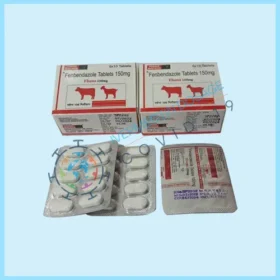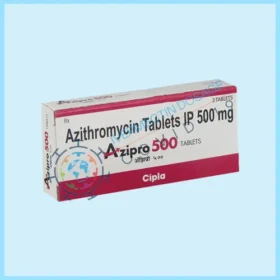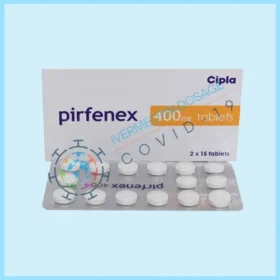- Your cart is empty
- Continue Shopping
Fenbendazole 150 Mg
$68.00 – $290.00
Fenbendazole 150 mg is an effective anti-parasitic medication commonly used for pets and livestock. While it shows potential for treating parasitic infections, its use in humans is not recommended without medical supervision. Always follow medical advice and never self-administer veterinary medications.
Introduction to Fenbendazole 150 mg
Fenbendazole is an anthelmintic medication commonly used to treat a variety of parasitic worm infections in animals. It is particularly effective against gastrointestinal parasites such as roundworms, hookworms, whipworms, tapeworms, and liver flukes. The 150 mg formulation is commonly available for veterinary use, but some off-label uses for human consumption have been reported, particularly in the context of certain parasitic diseases. Fenbendazole is available in several forms, including tablets, powder, and paste.
What is Fenbendazole?
Fenbendazole belongs to the class of benzimidazole anthelmintics, a group of drugs that works by interfering with the metabolism of the parasites. It has a broad spectrum of activity against various internal parasites, making it one of the go-to medications for parasitic infections, especially in livestock, pets, and sometimes humans. Fenbendazole is often used in the treatment of parasitic worm infestations in both domesticated animals and exotic species.
How Fenbendazole 150 mg Works
Fenbendazole works by disrupting the microtubular structures within the cells of parasites. It binds to tubulin, a protein that is essential for the formation of microtubules, which are part of the cell’s internal skeleton. Microtubules are crucial for many cellular functions, including cell division and the movement of organelles within cells. By inhibiting the formation of microtubules, Fenbendazole prevents the parasite cells from replicating and reproducing, eventually leading to the death of the parasite.
Fenbendazole is particularly effective against intestinal parasites. The drug is usually absorbed poorly from the gastrointestinal tract, so its effects are concentrated in the intestines where most of the parasitic activity occurs. In many cases, the treatment with Fenbendazole can clear parasitic infections in a relatively short period of time.
Benefits of Fenbendazole 150 mg
Fenbendazole 150 mg is primarily used for the treatment of parasitic infections, including the following benefits:
- Treatment of Gastrointestinal Worms: Fenbendazole is effective against a variety of intestinal worms, such as roundworms, hookworms, whipworms, and tapeworms. These worms can cause a variety of symptoms, including abdominal discomfort, diarrhea, vomiting, and weight loss.
- Broad-Spectrum Activity: Fenbendazole targets a wide range of parasitic organisms, making it versatile for treating mixed infections where multiple types of worms are present.
- Safe for Pets and Livestock: Fenbendazole is commonly used for deworming in pets, especially dogs and cats, as well as in livestock. This makes it an essential tool in veterinary medicine for preventing and treating parasitic infections.
- Possible Anti-Cancer Effects: There has been some research exploring the potential use of Fenbendazole for treating certain types of cancer in humans, though these studies are preliminary and the drug is not approved for this use.
- Affordable and Accessible: Fenbendazole is relatively inexpensive compared to many other anthelmintics, and it is widely available in veterinary formulations.
How to Take Fenbendazole 150 mg
Fenbendazole is typically administered orally, and the method of administration depends on the species being treated and the form of the medication (tablet, paste, or powder). For pets and livestock, it is generally given as follows:
- For Animals: The recommended dosage for animals typically ranges from 2.5 to 5 mg per kg of body weight per day, depending on the species and the infection being treated. For example, a dog weighing 10 kg might require a 25 mg to 50 mg dose per day for several days. For certain infections, it might be given over a period of 3-5 days.
- For Humans: Although Fenbendazole is not FDA-approved for human use, some individuals use it for off-label treatments against certain parasitic infections. The human dosage varies significantly based on the condition being treated. However, medical supervision is recommended, as the drug is not specifically approved for human consumption.
Fenbendazole is typically taken with food to improve its absorption, especially if it’s in a tablet form.
Who Makes Fenbendazole 150 mg?
Fenbendazole 150 mg is manufactured by several pharmaceutical companies, primarily for use in veterinary medicine. Some of the well-known brands that produce Fenbendazole include:
- Panacur: One of the most common brands of Fenbendazole used for treating parasitic infections in pets and livestock.
- Safe-Guard: Another well-known brand offering a similar formulation of Fenbendazole.
These medications are available in different forms such as oral paste, powder, and tablets.
Is Fenbendazole 150 mg Safe for Humans?
Fenbendazole 150 mg is primarily designed for veterinary use, and its safety for humans has not been fully established. In fact, it is not FDA-approved for human consumption. Some off-label human use of Fenbendazole has been reported, particularly for parasitic infections or even experimental cancer treatments, but these uses are not supported by definitive scientific evidence or approval by health authorities.
While Fenbendazole has a relatively low toxicity profile in animals, humans should not take Fenbendazole without the guidance of a healthcare professional. Pregnant women, breastfeeding mothers, and individuals with pre-existing health conditions (such as liver or kidney disease) should avoid using Fenbendazole unless explicitly prescribed by a physician.
Side Effects of Fenbendazole 150 mg
While Fenbendazole is generally considered safe when used in animals under veterinary supervision, it can have side effects, especially when taken inappropriately or at higher doses. Potential side effects include:
- Gastrointestinal disturbances: These may include vomiting, diarrhea, or abdominal pain.
- Allergic reactions: Rare but possible, with symptoms like skin rash, swelling, or difficulty breathing.
- Tiredness or lethargy: Some animals may experience fatigue as a result of the medication.
- Liver or kidney strain: Long-term use, especially in high doses, may affect liver or kidney function in animals.
In humans, the side effects are less well-documented, as Fenbendazole is not typically prescribed for human use. However, gastrointestinal upset and allergic reactions are common concerns for any medication.
Disclaimer
This content is for informational purposes only and should not replace professional medical advice. Fenbendazole is not FDA-approved for human use and should only be used in humans under the supervision of a healthcare provider. Always consult your doctor or veterinarian before starting any medication. The efficacy and safety of Fenbendazole for treating human health conditions have not been thoroughly studied.
Additional Information
| Tablet | 100 Tablet/s, 200 Tablet/s, 300 Tablet/s, 400 Tablet/s, 500 Tablet/s |
|---|---|
| Active Ingredient (Generic Name) | Fenbendazole |
| Indication | Intestinal Parasites |
| Manufacturer | Kachhela Medex Pvt. Ltd. |
| Packaging | 10 tablets in 1 strip |
| Strength | 222 mg |
| Delivery Time | 6 To 15 days |











Reviews
There are no reviews yet.